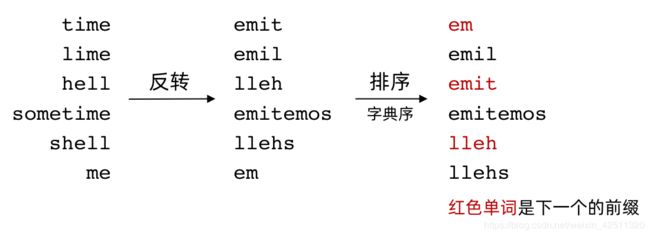- leetcode刷题日记——轮转数组
许_安
刷题日记leetcode算法排序算法
[题目描述]:[思路]:题目要求将一个整数数组向右轮转k个位置,右边超出的数,从左边插入因为是向右轮转k个位置,所以可以直接遍历数组,将其存放位置index加上k,但index+k可能会超出数组长度,即需要轮转到数组前面。由于数组元素个数为numsSize,也就是数组长度,我们可以通过(index+k)%numsSize取余来确定超出元素的位置运行如下voidrotate(int*nums,int
- LeetCode热题100JS(59/100)第十一天|46|78|17|39|22
Alicesflower
LeetCode热题100JSleetcodejavascript算法
46.全排列题目链接:46.全排列难度:中等刷题状态:2刷新知识:解题过程思考示例1:输入:nums=[1,2,3]输出:[[1,2,3],[1,3,2],[2,1,3],[2,3,1],[3,1,2],[3,2,1]题解分析参考题解链接:全排列放下1刷过程/***@param{number[]}nums*@return{number[][]}*///varpermute=function(num
- leetcode-50.Pow(x,n)
蒸土豆的技术细节
leetcode算法职场和发展
快速计算次方的方法。首先,先保证n是正数。如果nfloat:ifx==0:return0res=1ifn>=1returnres
- LeetCode第98题_验证二叉搜索树
@蓝莓果粒茶
算法leetcodelinux算法链表c++数据结构python
LeetCode第98题:验证二叉搜索树题目描述给你一个二叉树的根节点root,判断其是否是一个有效的二叉搜索树。有效二叉搜索树定义如下:节点的左子树只包含小于当前节点的数。节点的右子树只包含大于当前节点的数。所有左子树和右子树自身必须也是二叉搜索树。难度中等问题链接https://leetcode.cn/problems/validate-binary-search-tree/示例示例1:输入:
- 【LeetCode 热题 100】3. 无重复字符的最长子串 | python 【中等】
一只小白跳起来
leetcodejava算法开发语言
美美超过管解题目:3.无重复字符的最长子串给定一个字符串s,请你找出其中不含有重复字符的最长的长度。示例1:输入:s="abcabcbb"输出:3解释:因为无重复字符的最长子串是"abc",所以其长度为3。注意:考虑空字符串问题有重复之后要在重复的那个后面新建序列,减少时间,故需要列表储存(标准做法里用的集合捏)标准做法:把重复的set.remove(),a指针步进,没有重复的话,b指针一直步进怎
- leetcode刷题(javaScript)——栈、单调栈相关场景题总结
三月的一天
Leetcode刷题技巧总结javascriptleetcodelinux
在LeetCode刷题中,栈是一个常用的数据结构,可以帮助解决很多问题。以下是一些需要使用栈的方法,以及单调栈的应用场景:栈的使用技巧:栈常用于解决与括号匹配相关的问题,如括号序列的有效性、最长有效括号等。栈也常用于解决逆波兰表达式、表达式求值等与计算相关的问题。栈可以用于解决深度优先搜索(DFS)中的回溯问题,如组合、排列等。栈还可以用于解决某些需要“后进先出”(LIFO)特性的问题,如某些遍历
- 32.代码随想录算法训练营第三十二天|509. 斐波那契数,70. 爬楼梯,746. 使用最小花费爬楼梯
白鹭鸣鸣!
算法javadp
32.代码随想录算法训练营第三十二天|509.斐波那契数,70.爬楼梯,746.使用最小花费爬楼梯DP数组的定义以及下标的含义递推公式动态规划的初始化是很重要的遍历顺序打印数组509.斐波那契数-力扣(LeetCode)斐波那契数(通常用F(n)表示)形成的序列称为斐波那契数列。该数列由0和1开始,后面的每一项数字都是前面两项数字的和。也就是:F(0)=0,F(1)=1F(n)=F(n-1)+F(
- 【附JS、Python、C++题解】Leetcode面试150题(7)
moz与京
leetcode整理javascriptpythonc++
一、题目167.两数之和II-输入有序数组给你一个下标从1开始的整数数组numbers,该数组已按非递减顺序排列,请你从数组中找出满足相加之和等于目标数target的两个数。如果设这两个数分别是numbers[index1]和numbers[index2],则1targetIndex(vectornums,inttarget){intlength=nums.size();if(length<2){
- 【leetcode hot 100 46】全排列
longii11
leetcode算法数据结构
解法一:回溯法回溯法:一种通过探索所有可能的候选解来找出所有的解的算法。如果候选解被确认不是一个解(或者至少不是最后一个解),回溯算法会通过在上一步进行一些变化抛弃该解,即回溯并且再次尝试。用回溯算法来解决,遍历数组的每一个元素,然后尝试生成所有的排列,当生成一个完整的排列时,记录该排列,并退回到上一步,然后继续生成新的排列。就比如说“123”,我们可以先固定1,然后递归处理“23”。把“123”
- LeetCode 第30题:串联所有单词的子串
Gemini技术窝
leetcode算法数据结构java
大家好!今天我们要探讨的是一道非常有趣的字符串处理题目——LeetCode第30题:串联所有单词的子串。这个问题就像是在寻找字符串中的藏宝图,每个单词都是一个线索,我们需要把这些线索串联起来,找到它们在字符串中的位置。准备好了吗?让我们一起解锁这个问题的解决方案吧!文章目录问题描述解题思路高效代码实现详细讲解代码逻辑图解过程举例说明例子1:简单例子例子2:无匹配项例子3:重复单总结问题描述首先,让
- LeetCode每日一题——30. 串联所有单词的子串
hyk今天写算法了吗
#算法实例leetcode算法职场和发展数据结构python
文章目录题目示例思路题解题目给定一个字符串s和一些长度相同的单词words。找出s中恰好可以由words中所有单词串联形成的子串的起始位置。注意子串要与words中的单词完全匹配,中间不能有其他字符,但不需要考虑words中单词串联的顺序。示例示例1:输入:s=“barfoothefoobarman”,words=[“foo”,“bar”]输出:[0,9]解释:从索引0和9开始的子串分别是“bar
- 【LeetCode 热题100】 23. 合并 K 个升序链表的算法思路及python代码
pljnb
LeetCode热题100算法leetcode链表
23.合并K个升序链表给你一个链表数组,每个链表都已经按升序排列。请你将所有链表合并到一个升序链表中,返回合并后的链表。示例1:输入:lists=[[1,4,5],[1,3,4],[2,6]]输出:[1,1,2,3,4,4,5,6]解释:链表数组如下:[1->4->5,1->3->4,2->6]将它们合并到一个有序链表中得到。1->1->2->3->4->4->5->6示例2:输入:lists=[
- 【Leetcode刷题随笔】59 螺旋矩阵
Poor_DayDreamer
leetcode数组篇MediumTagleetcode矩阵算法
1.题目描述给定一个正整数n,生成一个包含1到n2所有元素,且元素按顺时针顺序螺旋排列的nxn正方形矩阵matrix。可结合以下原题链接阅读。原题链接:59螺旋矩阵2.解题思路本题为模拟矩阵填充过程,不需要设计算法,只要完成正确的填充过程即可。首先初始化一个nxn的二维矩阵(涉及到动态内存分配),从矩阵左上角开始往顺时针填充,关键在于填充的转角处不要重复填充,所以对于每条边都要遵循严格的统一规则,
- 【Leetcode刷题随笔】203移除链表元素
Poor_DayDreamer
leetcode链表篇leetcode链表算法
1.题目描述题意:删除链表中等于给定值val的所有节点。示例1:输入:head=[1,2,6,3,4,5,6],val=6输出:[1,2,3,4,5]示例2:输入:head=[],val=1输出:[]示例3:输入:head=[7,7,7,7],val=7输出:[]原题链接:203移除链表元素2.解题思路由于链表本身的性质,移除链表的某个节点a,只需要将前一个节点的next指针指向a的下一个节点即可
- 【Leetcode刷题随笔】844 比较含退格的字符串
Poor_DayDreamer
移除元素篇字符串篇leetcode算法职场和发展
1.题目描述给定s和t两个字符串,比较s和t是否在删除所有由#字符表示的退格操作后相等。退格操作会删除其前面(不包括#本身)的一个字符,如果前面没有字符则忽略该#。如果字符串的末尾有多个退格符,它们会相互抵消,直到没有退格符剩余或者所有字符都被删除。示例1:输入:s=“ab#c”,t=“ad#c”输出:true解释:s和t都会变成“ac”,因为#前面的b和d都被删除。示例2:输入:s=“ab##”
- 【Leetcode刷题随笔】2765最长交替子数组
Poor_DayDreamer
leetcode数组篇leetcode算法职场和发展
1.题目描述:该题目标是在一个整数数组nums中寻找最长的“交替子数组”。这种交替子数组的特点是:其元素按照“递增1,递减1,递增1…”的模式循环排列,且子数组的长度必须大于1,例如数组nums=[2,3,4,3,4],交替子数组有[2,3],[3,4],[3,4,3]和[3,4,3,4]。最长的子数组为[3,4,3,4],长度为4。详细题目描述见原题:原题。2.1解题思路一(双层循环):这道题有
- LeetCode刷题笔记
小李李李李腊八
leetcode算法java
leetcode_01两数之和斐波那契数列三个数最大乘积反转链表x的平方根环形列表LeetCode随笔两数之和给定一个整数数组nums和一个整数目标值target,请你在该数组中找出和为目标值target的那两个整数,并返回它们的数组下标。你可以假设每种输入只会对应一个答案。但是,数组中同一个元素在答案里不能重复出现。你可以按任意顺序返回答案。暴力法记录下数组第一个数值,对数组进行循环,将之后的值
- 高频SQL50题 第一天 | 1757. 可回收且低脂的产品、584. 寻找用户推荐人、595. 大的国家、1683. 无效的推文、1148. 文章浏览 I
榛果咖啡有点苦
高频SQL50题mysql
1757.可回收且低脂的产品题目链接:https://leetcode.cn/problems/recyclable-and-low-fat-products/description/?envType=study-plan-v2&envId=sql-free-50状态:已完成考点:无selectproduct_idfromProductswherelow_fats='Y'andrecyclable
- 动态规划问题
慕雪_mx
动态规划算法数据结构
动态规划问题最长回文子串题目:给你一个字符串s,找到s中最长的回文子串,并输出.(leetcode5)示例1:输入:s="babad"输出:"bab"解释:"aba"同样是符合题意的答案。示例2:输入:s="cbbd"输出:"bb"代码实现:char*longestPalindrome(char*s){intn=strlen(s);if(n=n)break;if(s[i]!=s[j]){dp[i]
- LeetCode 热题 100_跳跃游戏(78_55_中等_C++)(贪心算法)
Dream it possible!
LeetCode热题100leetcodec++贪心算法算法
LeetCode热题100_跳跃游戏(78_55)题目描述:输入输出样例:题解:解题思路:思路一(贪心算法):代码实现代码实现(思路一(贪心算法)):以思路一为例进行调试题目描述:给你一个非负整数数组nums,你最初位于数组的第一个下标。数组中的每个元素代表你在该位置可以跳跃的最大长度。判断你是否能够到达最后一个下标,如果可以,返回true;否则,返回false。输入输出样例:示例1:输入:num
- leetcode501-二叉搜索树中的众数
记得早睡~
算法小课堂leetcode算法javascript数据结构
leetcode501思路由于是二叉搜索树,那么我们知道它的特性:使用中序遍历得到的是从小到大排序的,所以我们利用这个规则,使用count来统计每次出现一个新的数的总个数,maxCount统计最大的个数值,result来存储二叉树中的众数,也就是要得到的结果值,pre用于统计前一个节点值初始化定义好值以后,我们需要使用中序遍历,中间处理逻辑值当pre还不存在的时候或者前一个节点跟后一个节点不相同时
- leetcode530-二叉搜索树的最小绝对值
记得早睡~
算法小课堂leetcodetypescriptjavascript算法数据结构
leetcode530思路这里题目有确切说明这个二叉树是:二叉搜索树那么我们可以想到二叉搜索树的特性,利用中序遍历:左中右得到的结果是从小到达排列的所以我们就只需要计算出每一个节点和前一个节点之间的差值,然后保存最小的差值就是本题答案所以我们在中序遍历的过程中需要存储最小的差值,我们首先初始化result为无穷大,还需要存储前一个节点,用于进行比较,每次遍历到一个节点的时候,我们比较resul和r
- LeetCode98-验证二叉搜索树
学习的学习者
LeetCodePython二叉搜索树
上个星期和导师去了华农一趟名义上是和导师去参加一个国家级的项目其实没我啥事都是我导师在那口若悬河当时和那边的本科生去了另一间会议室交流了关于GAN的知识偶然听说大家都在用pytorch好像最新版的也挺好用的反正就是学术界目前主要用这个框架工业界主要用Tensorflow(没办法,Google出品)这两天也拿来瞧了瞧好像也确实可以的!!!98-验证二叉搜索树给定一个二叉树,判断其是否是一个有效的二叉
- LeetCode第89题_格雷编码
@蓝莓果粒茶
算法leetcode算法职场和发展c++pythonunity游戏程序
LeetCode第89题:格雷编码题目描述n位格雷码序列是一个由2^n个整数组成的序列,其中:每个整数都在范围[0,2^n-1]内(含0和2^n-1)第一个整数是0一个整数在序列中出现不超过一次每对相邻整数的二进制表示恰好一位不同,且第一个和最后一个整数的二进制表示恰好一位不同给你一个整数n,返回任一有效的n位格雷码序列。难度中等问题链接格雷编码示例示例1:输入:n=2输出:[0,1,3,2]解释
- 动态规划 43. 最长回文子序列
Mophead_Zarathustra
小白的代码随想录刷题笔记Mophead的小白刷题笔记leetcodepython代码随想录动态规划
动态规划43.最长回文子序列516.最长回文子序列-力扣(LeetCode)代码随想录难度5-中等太难了,依然不会做。看完题解只觉得恍然大悟原来如此,但是不看直接做就感觉定义和递推就跟挤牙膏一样挤不出,挤出来了也不一定对。与动态规划42.回文子串-CSDN博客要形成对比注意本题中,子序列的要求是:不一定连续思路:(摘录、修改自代码随想录)dp定义:(重要,因为这道题求的是长度,而不是回文子序列个数
- 力扣SQL题记录(持续)
Dxecozy
leetcodesql
此贴用于个人写SQL题记录,主要是用于记录新的知识和一些个人觉得的难题思路,便于复习目录Leetcode高频SQL50题基本题基本条件筛选多表连接新知识CHAR_LENGTH()函数的使用,用于计算字符长度Leetcode高频SQL50题基本题基本条件筛选1757.可回收且低脂的产品584.寻找用户推荐人595.大的国家1148.文章浏览I多表连接1378.使用唯一标识码替换员工ID新知识CHAR
- 【Leetcode】11. 盛最多水的容器
Leuanghing
leetcode算法python
一、题目描述给定一个长度为n的整数数组height。有n条垂线,第i条线的两个端点是(i,0)和(i,height[i])。找出其中的两条线,使得它们与x轴共同构成的容器可以容纳最多的水。返回容器可以储存的最大水量。说明:你不能倾斜容器。示例1:输入:[1,8,6,2,5,4,8,3,7]输出:49解释:图中垂直线代表输入数组[1,8,6,2,5,4,8,3,7]。在此情况下,容器能够容纳水(表示
- 【Leetcode】12. 整数转罗马数字
Leuanghing
leetcode算法python
一、题目描述七个不同的符号代表罗马数字,其值如下:罗马数字是通过添加从最高到最低的小数位值的转换而形成的。将小数位值转换为罗马数字有以下规则:如果该值不是以4或9开头,请选择可以从输入中减去的最大值的符号,将该符号附加到结果,减去其值,然后将其余部分转换为罗马数字。如果该值以4或9开头,使用减法形式,表示从以下符号中减去一个符号,例如4是5(V)减1(I):IV,9是10(X)减1(I):IX。仅
- LeetCode135☞分糖果
fantasy_4
LeetCode刷题javapythonleetcode贪心算法算法
关联LeetCode题号135本题特点贪心两次遍历,一次正序遍历,只比较左边,左边比右边大的情况i-1i一次倒序遍历,只比较右边的,右边比左边大i+1i本题思路classSolution:defcandy(self,ratings:List[int])->int:candy=[1]*len(ratings)#右大于左foriinrange(1,len(ratings)):ifratings[i]>
- LeetCode134☞加油站
fantasy_4
LeetCode刷题pythonleetcodejava算法贪心算法
关联LeetCode题号134本题特点贪心局部最优解-部分差值如果小于0(消耗大于油站油量)就从下一个加油站开始,因为如果中间有小于0的情况当前站就不可能是始发站,整体最优解-整体差值如果小于0,那么就是不能有始发站本题思路classSolution:defcanCompleteCircuit(self,gas:List[int],cost:List[int])->int:curSum=0tota
- jdk tomcat 环境变量配置
Array_06
javajdktomcat
Win7 下如何配置java环境变量
1。准备jdk包,win7系统,tomcat安装包(均上网下载即可)
2。进行对jdk的安装,尽量为默认路径(但要记住啊!!以防以后配置用。。。)
3。分别配置高级环境变量。
电脑-->右击属性-->高级环境变量-->环境变量。
分别配置 :
path
&nbs
- Spring调SDK包报java.lang.NoSuchFieldError错误
bijian1013
javaspring
在工作中调另一个系统的SDK包,出现如下java.lang.NoSuchFieldError错误。
org.springframework.web.util.NestedServletException: Handler processing failed; nested exception is java.l
- LeetCode[位运算] - #136 数组中的单一数
Cwind
java题解位运算LeetCodeAlgorithm
原题链接:#136 Single Number
要求:
给定一个整型数组,其中除了一个元素之外,每个元素都出现两次。找出这个元素
注意:算法的时间复杂度应为O(n),最好不使用额外的内存空间
难度:中等
分析:
题目限定了线性的时间复杂度,同时不使用额外的空间,即要求只遍历数组一遍得出结果。由于异或运算 n XOR n = 0, n XOR 0 = n,故将数组中的每个元素进
- qq登陆界面开发
15700786134
qq
今天我们来开发一个qq登陆界面,首先写一个界面程序,一个界面首先是一个Frame对象,即是一个窗体。然后在这个窗体上放置其他组件。代码如下:
public class First { public void initul(){ jf=ne
- Linux的程序包管理器RPM
被触发
linux
在早期我们使用源代码的方式来安装软件时,都需要先把源程序代码编译成可执行的二进制安装程序,然后进行安装。这就意味着每次安装软件都需要经过预处理-->编译-->汇编-->链接-->生成安装文件--> 安装,这个复杂而艰辛的过程。为简化安装步骤,便于广大用户的安装部署程序,程序提供商就在特定的系统上面编译好相关程序的安装文件并进行打包,提供给大家下载,我们只需要根据自己的
- socket通信遇到EOFException
肆无忌惮_
EOFException
java.io.EOFException
at java.io.ObjectInputStream$PeekInputStream.readFully(ObjectInputStream.java:2281)
at java.io.ObjectInputStream$BlockDataInputStream.readShort(ObjectInputStream.java:
- 基于spring的web项目定时操作
知了ing
javaWeb
废话不多说,直接上代码,很简单 配置一下项目启动就行
1,web.xml
<?xml version="1.0" encoding="UTF-8"?>
<web-app xmlns:xsi="http://www.w3.org/2001/XMLSchema-instance"
xmlns="h
- 树形结构的数据库表Schema设计
矮蛋蛋
schema
原文地址:
http://blog.csdn.net/MONKEY_D_MENG/article/details/6647488
程序设计过程中,我们常常用树形结构来表征某些数据的关联关系,如企业上下级部门、栏目结构、商品分类等等,通常而言,这些树状结构需要借助于数据库完成持久化。然而目前的各种基于关系的数据库,都是以二维表的形式记录存储数据信息,
- maven将jar包和源码一起打包到本地仓库
alleni123
maven
http://stackoverflow.com/questions/4031987/how-to-upload-sources-to-local-maven-repository
<project>
...
<build>
<plugins>
<plugin>
<groupI
- java IO操作 与 File 获取文件或文件夹的大小,可读,等属性!!!
百合不是茶
类 File
File是指文件和目录路径名的抽象表示形式。
1,何为文件:
标准文件(txt doc mp3...)
目录文件(文件夹)
虚拟内存文件
2,File类中有可以创建文件的 createNewFile()方法,在创建新文件的时候需要try{} catch(){}因为可能会抛出异常;也有可以判断文件是否是一个标准文件的方法isFile();这些防抖都
- Spring注入有继承关系的类(2)
bijian1013
javaspring
被注入类的父类有相应的属性,Spring可以直接注入相应的属性,如下所例:1.AClass类
package com.bijian.spring.test4;
public class AClass {
private String a;
private String b;
public String getA() {
retu
- 30岁转型期你能否成为成功人士
bijian1013
成长励志
很多人由于年轻时走了弯路,到了30岁一事无成,这样的例子大有人在。但同样也有一些人,整个职业生涯都发展得很优秀,到了30岁已经成为职场的精英阶层。由于做猎头的原因,我们接触很多30岁左右的经理人,发现他们在职业发展道路上往往有很多致命的问题。在30岁之前,他们的职业生涯表现很优秀,但从30岁到40岁这一段,很多人
- 【Velocity四】Velocity与Java互操作
bit1129
velocity
Velocity出现的目的用于简化基于MVC的web应用开发,用于替代JSP标签技术,那么Velocity如何访问Java代码.本篇继续以Velocity三http://bit1129.iteye.com/blog/2106142中的例子为基础,
POJO
package com.tom.servlets;
public
- 【Hive十一】Hive数据倾斜优化
bit1129
hive
什么是Hive数据倾斜问题
操作:join,group by,count distinct
现象:任务进度长时间维持在99%(或100%),查看任务监控页面,发现只有少量(1个或几个)reduce子任务未完成;查看未完成的子任务,可以看到本地读写数据量积累非常大,通常超过10GB可以认定为发生数据倾斜。
原因:key分布不均匀
倾斜度衡量:平均记录数超过50w且
- 在nginx中集成lua脚本:添加自定义Http头,封IP等
ronin47
nginx lua csrf
Lua是一个可以嵌入到Nginx配置文件中的动态脚本语言,从而可以在Nginx请求处理的任何阶段执行各种Lua代码。刚开始我们只是用Lua 把请求路由到后端服务器,但是它对我们架构的作用超出了我们的预期。下面就讲讲我们所做的工作。 强制搜索引擎只索引mixlr.com
Google把子域名当作完全独立的网站,我们不希望爬虫抓取子域名的页面,降低我们的Page rank。
location /{
- java-3.求子数组的最大和
bylijinnan
java
package beautyOfCoding;
public class MaxSubArraySum {
/**
* 3.求子数组的最大和
题目描述:
输入一个整形数组,数组里有正数也有负数。
数组中连续的一个或多个整数组成一个子数组,每个子数组都有一个和。
求所有子数组的和的最大值。要求时间复杂度为O(n)。
例如输入的数组为1, -2, 3, 10, -4,
- Netty源码学习-FileRegion
bylijinnan
javanetty
今天看org.jboss.netty.example.http.file.HttpStaticFileServerHandler.java
可以直接往channel里面写入一个FileRegion对象,而不需要相应的encoder:
//pipeline(没有诸如“FileRegionEncoder”的handler):
public ChannelPipeline ge
- 使用ZeroClipboard解决跨浏览器复制到剪贴板的问题
cngolon
跨浏览器复制到粘贴板Zero Clipboard
Zero Clipboard的实现原理
Zero Clipboard 利用透明的Flash让其漂浮在复制按钮之上,这样其实点击的不是按钮而是 Flash ,这样将需要的内容传入Flash,再通过Flash的复制功能把传入的内容复制到剪贴板。
Zero Clipboard的安装方法
首先需要下载 Zero Clipboard的压缩包,解压后把文件夹中两个文件:ZeroClipboard.js
- 单例模式
cuishikuan
单例模式
第一种(懒汉,线程不安全):
public class Singleton { 2 private static Singleton instance; 3 pri
- spring+websocket的使用
dalan_123
一、spring配置文件
<?xml version="1.0" encoding="UTF-8"?><beans xmlns="http://www.springframework.org/schema/beans" xmlns:xsi="http://www.w3.or
- 细节问题:ZEROFILL的用法范围。
dcj3sjt126com
mysql
1、zerofill把月份中的一位数字比如1,2,3等加前导0
mysql> CREATE TABLE t1 (year YEAR(4), month INT(2) UNSIGNED ZEROFILL, -> day
- Android开发10——Activity的跳转与传值
dcj3sjt126com
Android开发
Activity跳转与传值,主要是通过Intent类,Intent的作用是激活组件和附带数据。
一、Activity跳转
方法一Intent intent = new Intent(A.this, B.class); startActivity(intent)
方法二Intent intent = new Intent();intent.setCla
- jdbc 得到表结构、主键
eksliang
jdbc 得到表结构、主键
转自博客:http://blog.csdn.net/ocean1010/article/details/7266042
假设有个con DatabaseMetaData dbmd = con.getMetaData(); rs = dbmd.getColumns(con.getCatalog(), schema, tableName, null); rs.getSt
- Android 应用程序开关GPS
gqdy365
android
要在应用程序中操作GPS开关需要权限:
<uses-permission android:name="android.permission.WRITE_SECURE_SETTINGS" />
但在配置文件中添加此权限之后会报错,无法再eclipse里面正常编译,怎么办?
1、方法一:将项目放到Android源码中编译;
2、方法二:网上有人说cl
- Windows上调试MapReduce
zhiquanliu
mapreduce
1.下载hadoop2x-eclipse-plugin https://github.com/winghc/hadoop2x-eclipse-plugin.git 把 hadoop2.6.0-eclipse-plugin.jar 放到eclipse plugin 目录中。 2.下载 hadoop2.6_x64_.zip http://dl.iteye.com/topics/download/d2b
- 如何看待一些知名博客推广软文的行为?
justjavac
博客
本文来自我在知乎上的一个回答:http://www.zhihu.com/question/23431810/answer/24588621
互联网上的两种典型心态:
当初求种像条狗,如今撸完嫌人丑
当初搜贴像条犬,如今读完嫌人软
你为啥感觉不舒服呢?
难道非得要作者把自己的劳动成果免费给你用,你才舒服?
就如同 Google 关闭了 Gooled Reader,那是
- sql优化总结
macroli
sql
为了是自己对sql优化有更好的原则性,在这里做一下总结,个人原则如有不对请多多指教。谢谢!
要知道一个简单的sql语句执行效率,就要有查看方式,一遍更好的进行优化。
一、简单的统计语句执行时间
declare @d datetime ---定义一个datetime的变量set @d=getdate() ---获取查询语句开始前的时间select user_id
- Linux Oracle中常遇到的一些问题及命令总结
超声波
oraclelinux
1.linux更改主机名
(1)#hostname oracledb 临时修改主机名
(2) vi /etc/sysconfig/network 修改hostname
(3) vi /etc/hosts 修改IP对应的主机名
2.linux重启oracle实例及监听的各种方法
(注意操作的顺序应该是先监听,后数据库实例)
&nbs
- hive函数大全及使用示例
superlxw1234
hadoophive函数
具体说明及示例参 见附件文档。
文档目录:
目录
一、关系运算: 4
1. 等值比较: = 4
2. 不等值比较: <> 4
3. 小于比较: < 4
4. 小于等于比较: <= 4
5. 大于比较: > 5
6. 大于等于比较: >= 5
7. 空值判断: IS NULL 5
- Spring 4.2新特性-使用@Order调整配置类加载顺序
wiselyman
spring 4
4.1 @Order
Spring 4.2 利用@Order控制配置类的加载顺序
4.2 演示
两个演示bean
package com.wisely.spring4_2.order;
public class Demo1Service {
}
package com.wisely.spring4_2.order;
public class

